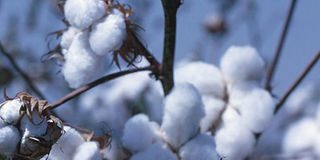Govt discourages farmers from growing organic cotton

Farmers have been discouraged from growing organic cotton because it allegedly lacks adequate market.
Farmers majoring in growing organic cotton have been advised by the Ministry of Agriculture, Animal Industry and Fisheries not to venture in this initiative since the product allegedly lacks adequate market both in Uganda as well as internationally.“Both the Ministry of Agriculture and the management of Cotton Development Authority have been discouraging farmers from growing organic cotton here because rural farmers involved in this activity are not benefiting anything out of it. The production of this cotton has been engineered by some investors who pay the farmers as low as Shs6 for every bale sold,” Mr Samuel Semanda, the commissioner in charge of Agriculture planning at the ministry, told a group of scientists and stakeholders at the Open Forum on Agro Biotechnology in Africa (OFAB) in Kampala recently.
“It is not possible to grow organic cotton here because the product is usually infested by pests and diseases and therefore farmers realise very little yields.”He said the product itself is not competitive in the local market as well as the international markets.“The organic cotton promoters are paying the farmers lesser than those growing it using the conventional methods, secondly there is no contract between the farmers and the promoters. No one has come up to establish an industry for this kind of cotton here,” Mr Semanda said.
“Some company called Hyper came here claiming ownership of the product but CDA and the ministry advised farmers not to associate with them because their aim was to exploit farmers. Those who used to grow 134,000 bales are now growing 65,000 bales per season. This means they are earning little income.” Ms Lubwama from CDA said the organisation is discouraging the growing of organic cotton because farmers have made huge losses and that the average yields grown annually are now at 20 per cent with the worst being 0% mainly because the current environmental impacts on organic cotton are not that good because the crop is being infested by the ball warm, which is a major pest affecting the growing of cotton worldwide.
This product, according to Mr Semanda, is being grown in the East and Northern parts of Uganda under the influence of some investors but in 2006, Eng. Hilary Onek asked scientists from the National Research Organisation (Naro) to carry out research to see if it is possible to grow cotton organically minus applying any spray but the result was negative. However, according to a 2002 report for the Pesticide Action Network from a United Kingdom company on a project aimed at eradicating pesticides and poverty among farmers growing cotton in Northern Uganda, it is reported that the farmers growing organic cotton in this region were to sell it at a set price called organic price premiums.
“While agriculture in the Northern areas of Uganda is almost organic by default, the main interest for farmers to participate in the organic project, including cotton, lies in the higher prices paid for organic produce. The project claims that they pay a premium price of about 15 per cent to farmers over the conventional price. However, there are several issues that need to be considered when dealing with the organic price premiums,” the report reads.
The report further indicates that most of the registered farmers that grow cotton organically and are certified by foreign inspectors are not able to sell their organic produce to the project at organic premium prices. Notwithstanding, only some 15 per cent of all organic cotton produced and certified in the project areas is in effect being bought at organic premium prices. The other 85 per cent of farmers may aspire to sell their produce at an organic premium price, but in the end they have to sell their certified organic produce at conventional seed cotton prices to conventional cotton traders.




